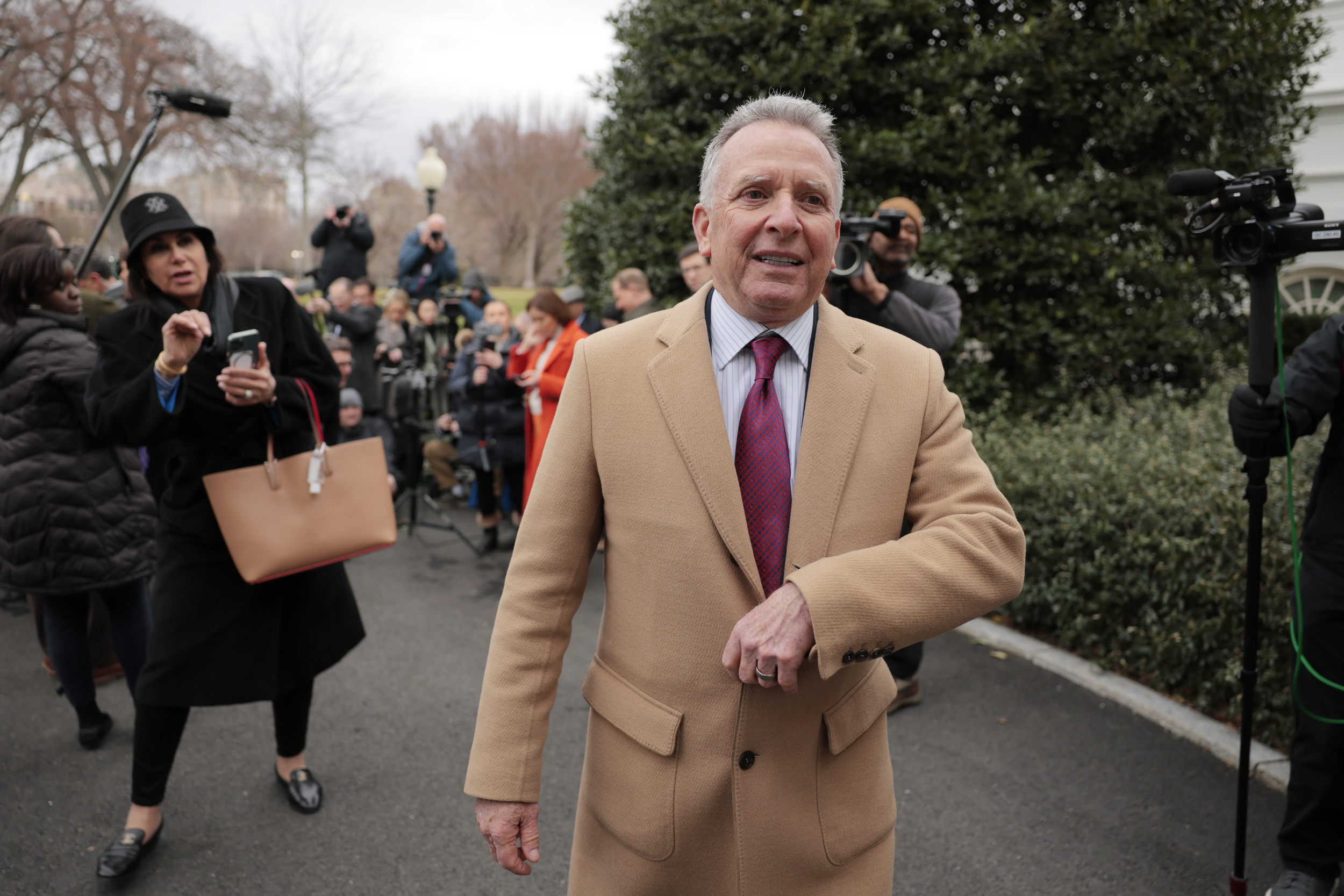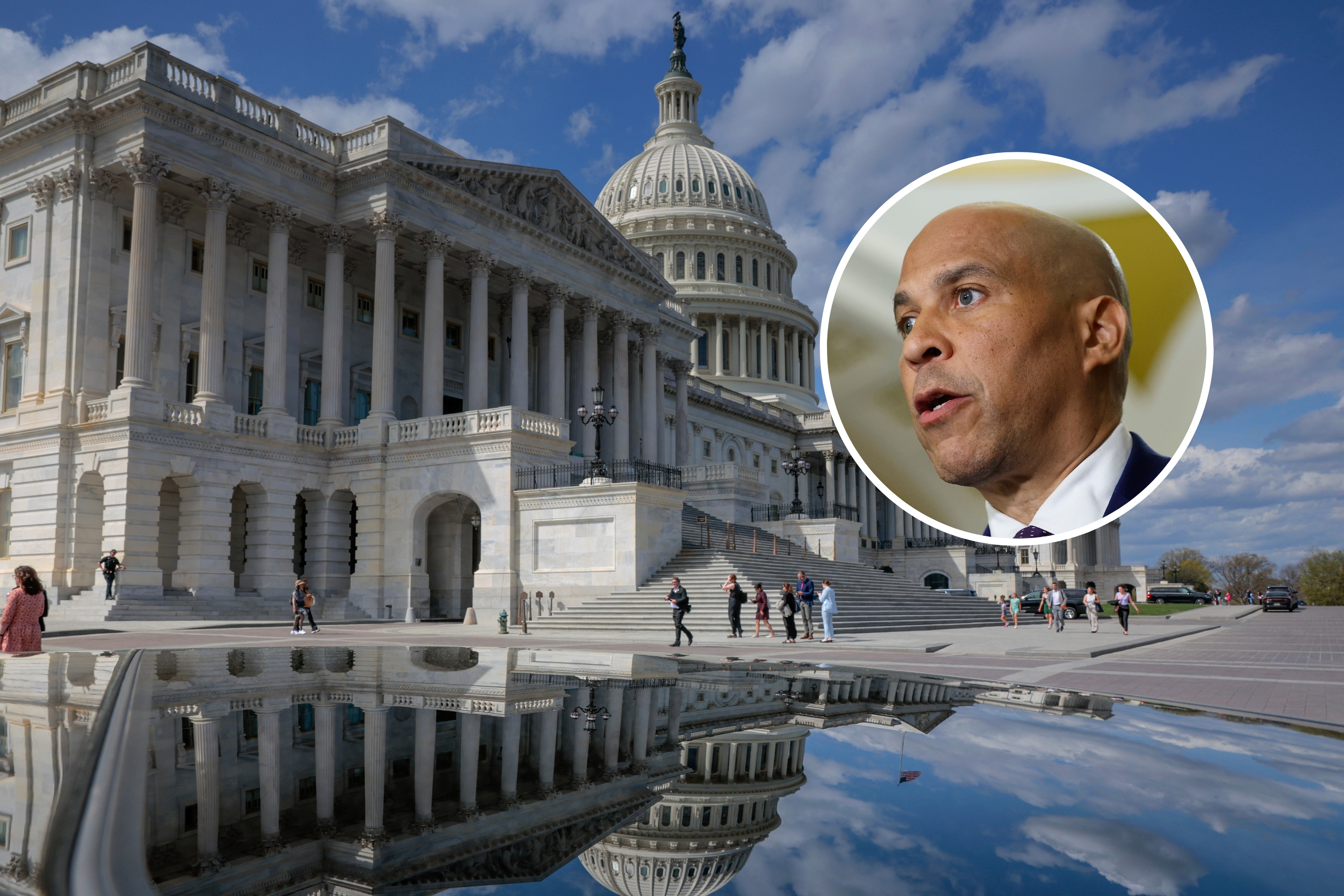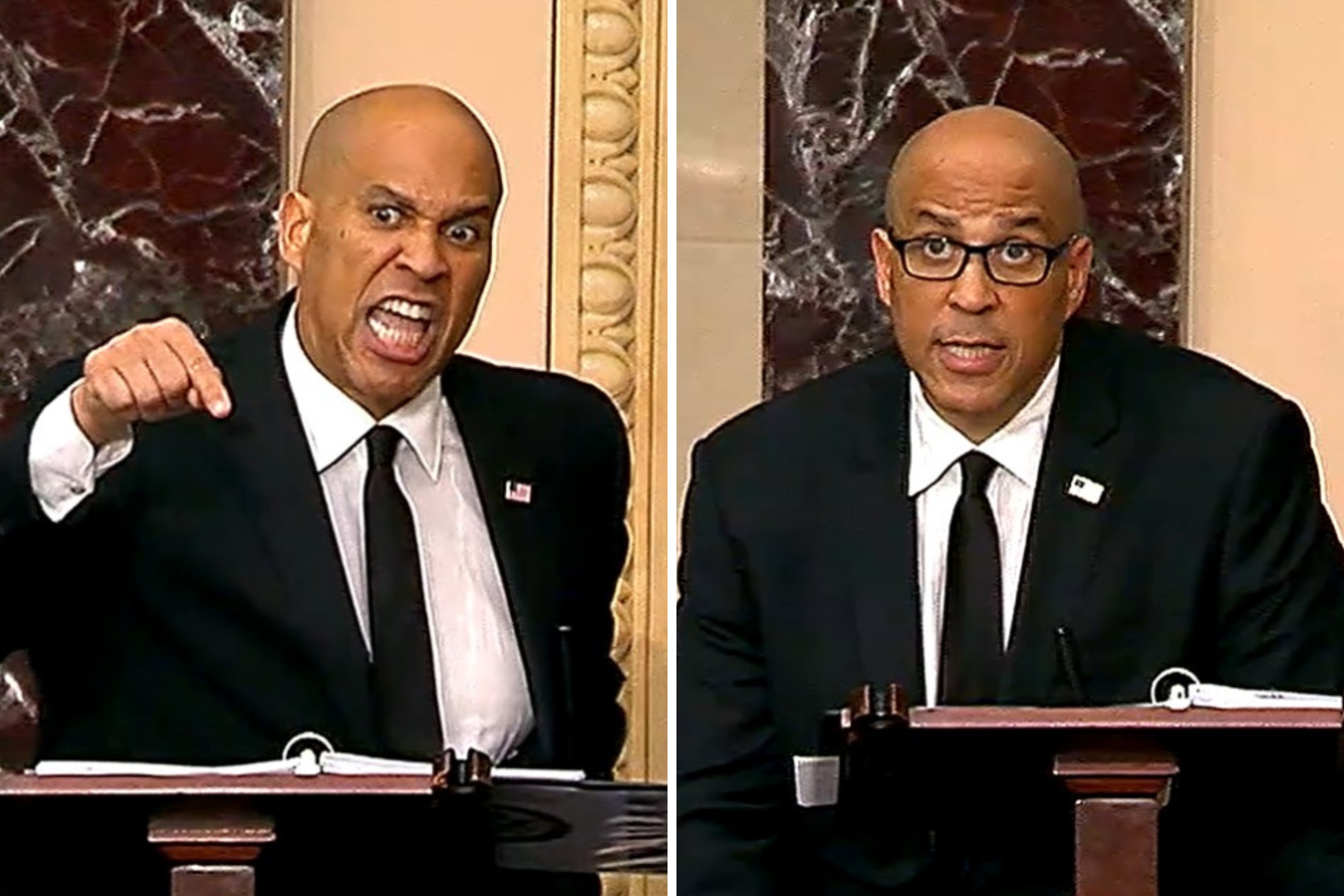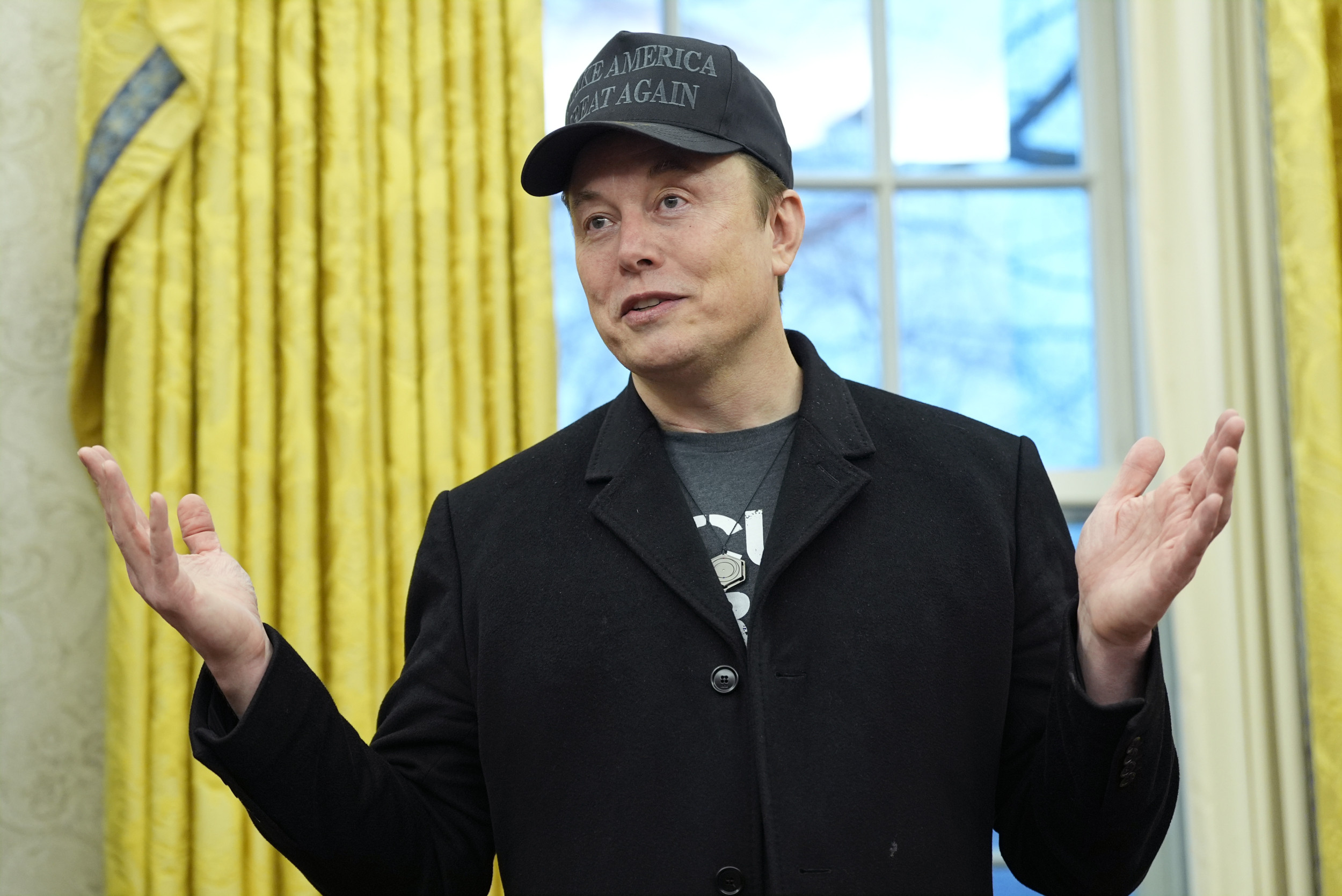Estonian Minister of Foreign Affairs Margus Tsahkna told Newsweek in an interview that he believes Russian President Vladimir Putin is "playing" with the Trump administration when it comes to a lasting peace deal with Ukraine.
Estonia is a NATO member and one of the three NATO allies — including newly-admitted Finland — that share a border with Russia.
Why It Matters
President Donald Trump on Monday announced that Russia and Ukraine had agreed to a deal that would "eliminate the use of force" in the Black Sea following talks in Saudi Arabia – a key step towards a broader peace deal that could end the war in Ukraine.
Ukrainian President Volodymyr Zelensky has previously raised concerns about the long-term viability of any deal with Putin, most notably during last month's high-profile argument with Trump and Vice President JD Vance in the Oval Office. He said then that Kyiv had previously signed agreements with Russia that Putin ignored when he invade Ukraine in 2022.
Zelensky reiterated that stance on Wednesday, accusing Russia of sending 117 drones overnight and targeting civilian infrastructure, including homes, following the news of the Black Sea deal. He argued that Putin sent a "clear signal to the whole world that Moscow is not going to pursue real peace."
In the interview Tuesday in Washington, Estonia's Tsahkna agreed with Zelensky, saying Putin had"broken all the deals that he has made," adding "from our perspective and our experiences, we can't trust Putin."
"My greatest concern is that Putin actually doesn't want to have any kind of peace — just and lasting peace, sustainable peace — and he's just playing with President Trump, playing with Ukraine, playing with all of us," Tsahkna said.
"Because I have some reasons for that as well to be suspicious: Because President Putin has always said that the main thing he's going to use all these talks [to do] is to eliminate the "root causes," and the root causes for him is not about Ukraine or some territories. It's about U.S. influence in Europe."
At the same time, Tsahkna stressed that Estonia remains confident in the U.S. commitment to NATO and the alliance's strength and power following a meeting with Secretary of State Marco Rubio on Tuesday.
Tsahkna said he has "no doubt" that the U.S. is "committed to NATO" and "committed to Baltic States," and he is "happy as well that President Trump again has pushed European countries in NATO to invest more heavily to defense."

What to Know
Newsweek spoke with Tsahkna on camera at the Estonian Embassy in Washington, D.C. on Tuesday. The Estonian foreign minister has held his post since April 2023, having served in his role for the majority of the Russia-Ukraine war. The discussion has been edited for brevity and clarity.
Q: Obviously, the great concern right now is what's going on in Ukraine and Russia, and the impacts in NATO. What is your greatest concern regarding the current talks between Russia, Ukraine and the US?
A: My greatest concern is that Putin actually doesn't want to have any kind of peace - just and lasting peace, sustainable peace - and he's just playing with President Trump, playing with Ukraine, playing with all of us, because I have some reasons for that as well to be suspicious: Because President Putin has always said that the main thing he's going to use all these talks is to eliminate the root causes, and the root causes for him is not about Ukraine or some territories. It's about U.S. influence in Europe. It's about the NATO enlargement processes from the past. It's about European security architecture. It's about, actually, so-called, restoration of Soviet Union. So he actually declared that already, 2007 in Munich Security Conference, and now he's fulfilling the plans. And the facts, what [they] are based on, is that actually he had a plan for the six or three days special operation in Ukraine, take over Ukraine and destroy totally the independence of Ukraine. He failed that totally.
Now he's waging more than three years full-scale war, with all the atrocities, killing hundreds of thousands of people - Russian people, Ukraine people, deporting children - but he hasn't not been successful. He has not been successful about gaining these kind of goals he had, and he has not made any strategic breakthroughs during this war, because Ukrainians, they have been fighting heavily, and also we all, we have been supporting Ukraine. Now he's trying to use these talks about gaining the other goals, and it's not about finding the peace. We see as well that President Trump, together with President Zelensky, U.S. and Ukraine, they have put on the table the proposal, let's have a full scale ceasefire. It's like a precondition to start -to] negotiate, and we don't have it. We don't have it.
And also, we have more conditions from Putin side, even today, after the talks. If you read the notes from U.S. and Ukraine side, they're talking about the Black Sea...if you read the readout from Russian side, you are reading more conditions, preconditions for this kind of thing. So, I cannot see the real willingness from Putin. What we need to do together with President Trump and Ukraine is actually to make it clear whether Putin wants to have peace or not. This is my main concern.
Q: Do you worry that Putin would break this deal in a similar way that he allowed the grain deal brokered through the UN to collapse?
A: Putin has broken all the deals that he has made. As president Zelensky has said as well, and we can ensure that from our perspective and our experiences, we can't trust Putin, and this is already old, knowing from our side as well, because we have been living long time as a bordering country of Russia, you must put Russia in the weak position, and then talk to them. And you need to push them to the solution. They only accept the strength.
This has been always like this, and it is, as I said before, as well, it is exactly right now as well. So every new compromise is a new red line for them, and they are asking more, and they are not asking about even about the topic how to find the peace in Ukraine. They're asking many, many other things,so that's really unfortunate.

Q: Over the weekend, U.S. Special Envoy Steve Witkoff gave a few interviews in which he made comments essentially legitimizing Russia's claim over the disputed territories in Ukraine, and he said that he takes Putin at his word. Do you worry that the Trump administration is too trusting of Putin, and what do you say to Witkoff after making those kinds of comments?
A: Yes, we are going to comment everything online, what one or the other person is saying, so we can find ourselves in a very difficult situation, but I think that maybe it is a part of the tactics. Maybe not. I don't know, but I'm really sure that, as with Estonia, Latvia, Lithuania, U.S. would not recognize the occupation in the beginning. During the 50 years of Soviet Union occupation in the Baltic states, there was a really clear non-recognition policy.
So I can say only as a foreign minister of Estonia that Estonia will never accept the fact that one of the other countries changing the territories, using military force. So territorial integrity is a core issue for us, and I think for everyone else in the world. But if we are talking about the ceasefire, if we are talking about the momentum, where Ukrainians, where Russia is, that we need to have this kind of ceasefire to start to negotiate about the further steps, because the goal for Trump and also for Ukraine and for us as well, is a sustainable peace ... a long, lasting peace.
Then we need to talk about, as well, the release of hostages. We didn't know that more than 20,000 children they had deported. So as well territories. But as well, we need to talk about the working security guarantees or the or the other system of architecture that Russia will never start aggression again. But we are not at that point yet.
In Europe, we have understood clearly that we need to take responsibility, so we already formed the coalition of the willing. European leaders are meeting again this Thursday in Paris. Estonia will be there. We are ready to put our commitment on the table. But there are preconditions, and the first precondition is actually that we will see that Putin will like to have a peace. So these are the cases. So let's see what is going to happen.
Q: The Trump administration has stressed that they believe economic security guarantees are as effective as military security guarantees. Do you agree with that view, and should the U.S. expand those kinds of economic guarantees to more countries within the alliance or on the border with Russia?
A: Of course, the economic guarantees are very well-working guarantees in the meaning that if you have a strategic investments, you have your companies in one of the other country, though you need to protect them. But the question is, how then you're going to protect them, if one or the other will attack this precise country?
So finally, we reach on that level that Ukraine and as well other countries as Estonia is already more than 20 years in NATO, there must be established as well the security guarantees, which are mainly military. Europe is ready to do that. Europe is ready to take responsibility, but we need to work together. That's the main thing. So this is what we are talking about. This is an alliance in the beginning, and of course, if U.S. is going to decide to invest heavily to strategic economy, to Ukraine or to Estonia, Latvia, Lithuania, Poland, whenever, we will be more than happy. This is like assurance that the U.S. is taking this concrete country as an ally and ready to protect it as well.
But, you know, we are member of NATO. We are a member of European Union, but Ukraine is just in the middle of the war, which has been started by President Putin and Russia. I think that this minerals agreement is framed that it can be followed by Western real cooperation, companies and people working in Ukraine, of course, establishing the higher level of security guarantees right now.
Q: Do you have any concerns about the U.S. commitment to NATO? And do you believe that NATO is in a better place now than it was three years ago?
A: NATO is in better place than three years ago, because NATO is stronger than ever before. We have Finland. Sweden joined NATO and from all perspective and in our region, it's a lot. And this is a paradox that Putin has been the best salesman of the NATO enlargement and also the enlargement processes of the European Union. And now happily we welcome these two very strong nations in our region to NATO. So NATO is in solid place. So if you wanted to ask about Article Five and this kind of assurances, I have no doubt that the U.S. is there. We had a meeting today with Secretary Rubio. Had no doubt that U.S. is committed to NATO. U.S. is committed to Baltic states, but as a foreign minister of Estonia and previous defense minister, I'm happy as well that President Trump again has pushed European countries in NATO to invest more heavily in defense.
I think that they would have done it and should have done it already 10 years ago, and we Estonians, we don't need to change our policies. We have decided already that we are crossing the two percent agreed investment level. We decided last week that we reach at least five percent next year, and it can probably it's going to be even up. So we see that all the Baltics, also Poland, which is a big country, is doing five percent within the next years. But it is not only because of President Trump. It's because we see the real threat from Russia. We have agreed in NATO the regional defense plans already during the NATO Summit in Vilnius two years ago, and we are just fulfilling the gaps that we have agreed.
And I'm very happy that the other NATO member states in Europe, they are following that. We saw last week the historical decision from Germany, when Germany really decided first time after the Second World War, to invest to its own security and defense capabilities close to a trillion euros. This is amazing thing, and they are the largest economy in Europe as well. So we see that many other nations, as in all the Nordics, they are doing the same things. This is something that satisfies as well, the criticism from the U.S. side, more precisely, maybe as well, from President Trump, sides that Europe really has been working up, so we invest heavily more.
But I'm sure that the NATO is important for both sides, for Europe, for for U.S. as well. Because if anything is happening with with with NATO, meaning that Article Five is not working, everyone will lose, and also U.S. will lose its strong position as a leader on global level. So that's why I'm sure, I have no any kind of proof, that actually U.S. is not committed to NATO.
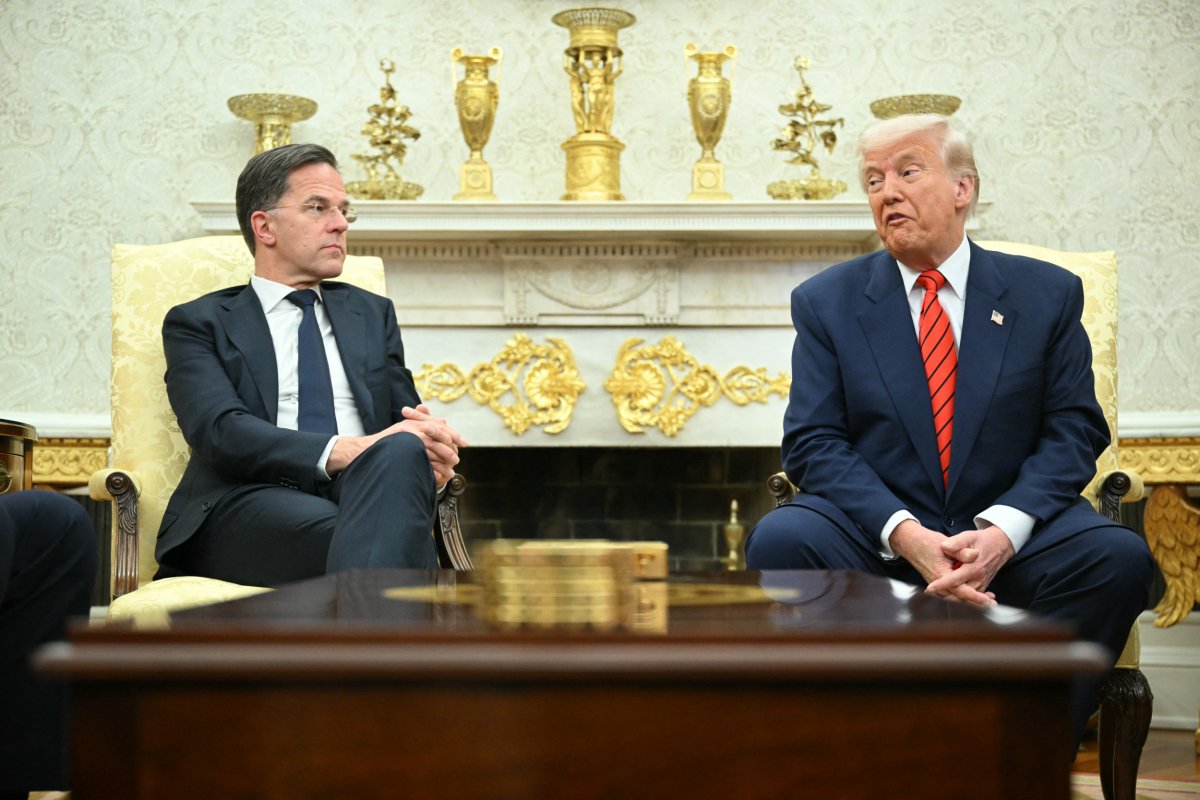
Q: Do you have a message for the NATO members who still haven't met that 2 percent level? [NATO Secretary General Mark] Rutte said recently that NATO should [consider] spending way more than 3 percent. You said you're aiming for 5 [percent]. Do you believe that all NATO members can achieve that?
A: You know, the GDP figure is always bigger. Even the country sizes are different. Economies are smaller and bigger, but 5 percent or whatever, percent of GDP shows the burden to your people, to your economies. So Estonia, Latvia, Lithuania, Poland, we have as well pensioners, we have as well the education systems, we have as well the social systems, medical systems, but my message is clear that these kind of peace times are over.
The second thing is that no one else is coming to solve our problems in Europe. We need to understand that if we want U.S. standing together with us, we need to pay and invest as well to our capabilities. The burden must be shared. It's very, very honest thing to us from U.S. as well. It is a good thing for our alliance, but as well, Russia will remain a threat. And it's not only our problem as bordering countries. We are protecting, literally, NATO. We are protecting Europe, and we have witnessed during the last three years, during the full scale of war in Ukraine, that even the war in Ukraine has put our economy - we all pay more, not only by supporting Ukraine, but also if you see the economic or growth in Europe, if you see the sanction regime results so on.
So it is most, cheapest way now to invest in defense. Two percent, it's not any more than ... if you're talking at least like three, 3.5 percent average for every NATO member, and I do believe that we will find this kind of common understanding during the Hague NATO Summit this summer.
Q: Do you have concerns that increasing military spending will hurt other areas of the economy or other programs in terms of — you mentioned pensioners and education — do you worry that you will have to move resources from those programs to finance the military growth?
A: You know, my nickname in Estonia is "cutting crocodile," so we have passed this already, 2008 and 2009, when we have economic crisis as well. Now we are doing heavy cuts, but not from actually the benefits or this kind of social systems as much, but for about how much actually we are spending for running our bureaucracies, our, you know, state solutions. And I see lots of opportunities for innovation.
Estonia is the, you know, the digital nation. We are very digitalized country about our services, so I see many, many opportunities to cut the bureaucracies. But of course, cutting our budgets, this is not the only solution, because this jump - what we need to do all together with our capabilities — I think that it needs to for us to take the long term loans, and our children will pay for that as well. But it's better to have the secured environment, to have the secured countries, to have freedom, instead of waging the full scale war. And this is reality, the war may come if we are not investing enough to our defense expense, and also, this is not for preparing the war. This is for deterrence that Putin would understand that the price for him will be too high to even think about the new aggression.
Q: One of the [issues] that has also troubled Europe in the past decade has been the immigration crisis — something that the U.S. is also concerned about on its front. Do you feel that Europe has made good progress with this crisis? Where do you see the current state of immigration across the union?
A: It's a rightful question, because the mass immigration to Europe from different countries, it has happened before. Maybe I think that the most critical year was 2015, [2016]. And if you see as well the different elections amongst you know, different countries. The question is, there we see as well this part is increasing — the popularity of those who were very critical about the immigration questions — but also European Union has taken the measures against that. But from Estonian perspective, I can say that we are securing the border between different between different civilizations. So we are protecting the NATO and EU border, and this border is closed as well.
In Latvia, Lithuania, Finland, Poland, we check literally every asset, every person, every vehicle, every car who's trying to cross the border. We are pushing back illegal people who normally are weaponized as well from the Russian side as so-called immigrants, but actually they are weapons to disturb our societies and so on. So I think that there has been a huge change about the attitude towards the immigration in Europe as well. We see, unfortunately, increase of antisemitism in Europe as well, and it has been connected to Gaza situation. So we have this instability as well different countries about the foreign policy based on the domestic problems. So I think that this problem is well heard as well in Europe.
Q: As you mentioned Gaza: There's been a collapse recently with th at ceasefire deal, but there's still this eye towards what happens next. Do you see a role for Europe in a rebuild of Gaza, or is that something you think needs to mainly be handled by the Middle Eastern countries and the neighbors in that region?
A: European Union and European countries, we have been very active already years in the region. And also we have been very, I think, the largest and the biggest donor to build up societies there, and also humanitarian support and education support and so on. But of course, it needs, finally, the two state solution, needs the two states to agree that they can live together and people they can live together, but we are really far away from that.
And of course, Israel has all the right to protect itself, and no one is happy about this humanitarian crisis there as well. But there is no excuse for the terroristic organizations to terrorize the Israeli people, terrorize the region as a whole, and I'm really happy that we can talk to the leading countries in the region as well to find the ways out. We have had the ceasefires. We have had the exchange of the [prisoners] and so on. But now as well, I cannot see the very quick solution there, unfortunately.
Q: Circling back to immigration: A lot of the migrants came from other countries, and I believe most of them were actually in Middle East — from Yemen and other countries — and there's been talk about moving the Palestinians as part of this rebuild. Do you see that as a problem to try and displace them? Or is that something you see as a step towards rebuilding?
A: You know, as a Estonian, I can say that the displaced people from the territories they have been living in is not a solution. So I think that we need to find another solution. Then there won't be a terroristic organizations who are terrorizing the neighbors. There won't be an unstable situation that actually the people can live together.... be honest, there is a conflict between different religions. And it's not only about the Christianity and Muslims like different understandings, and this is about the history as well.
My question is, can we find a peace in this kind of regions when the causes, root causes, really, they're going back to hundreds and hundreds and hundreds of years? So the bad thing is that just innocent people are paying for that, and they are used by political ways. So just dislocating people, just like mechanically, it doesn't bring the solution there.
Q: [We have] seen a surge of right-wing support in Europe. We saw that the elections last year in the European Parliament, there was a surge. We've seen [right wing] parties making gains in Germany, especially. Do you see a near future possibility that the right wing parties dominate European politics? Or do you think this is a short term issue?
A: If the establishment, or however we call it, these parties who are responsible for the government, are not actually meeting the expectation from the people — so it may happen. But I think as well as I see the democracy in Europe, which is in very good condition, that the reactions they have been there, you see more conservative policies about immigration. You see more conservative understanding about the total openness of different issues. So this is the reaction, but my concern is that we need to give the opportunity for all people, wherever they are, to base their own choices on the solid information.
So we are living in the times when you can find in social media platforms, everywhere, online, total disinformation. I'm not talking only about the flat earth theory ... but I'm talking about real issues that people are deeply concerned and they very often they don't have, actually the objective information of what is really going on, and this kind of manipulations, they are more often using AI solutions, using AI-based communication robots in the future as well, which is not controlled by the civil societies. They are controlled by whatever the organization.
So I think that we all need to face with a new reality. How can we really run our democracies, which are based on the solid information and based on freedoms, freedom of speech, freedom of religions, freedom of internet as well? We need to understand that we are living in a totally new world, and these technologies are developing quicker than we are thinking. We are not talking about decades. We're talking about weeks, months and years. This is the topic we need to deal with.
Q: People would say that the greatest competitor in those areas [technology] is China. Do you worry about the advances China is making in technology, including AI robotics, and do you believe that this is a significant threat to Europe?
A: Of course, China is not based on economy. Everything in China is political, and China is using economical power to control the world. So this is a threat, of course, and it's not about only AI, it's about many other solutions of technological level. We are talking about defense industry, we're talking about energy, we're talking about communication. So we need to face that, and we need to cut the dependence from China. But also we are talking about the global companies, which is even hard to say which government is controlling that. This is something we need to understand, that we need to protect our people.
And this is a debate as well will be probably between Europe and U.S., about how can we develop together, the AI platforms, how we develop together the global companies which are actually putting our people on the dependence positions. So I think that this kind of debate and also cooperation is crucial. But you are right. China is using all the different opportunities to increase its influence. They call it economical cooperation, but be honest, behind that, this is one thousand year plan how to have more influence on political level.
Q: What do you view as the number one issue facing the U.S. and European relationship, and what would your advice to President Trump be to handle it and start to move towards a solution for it?
A: I think that we both need to understand Europe and also U.S. that this transatlantic point is really very strong, and this is existential. And I'm not talking about defense cooperation. I think that NATO is in solid place if we can share the burden, and Europe is doing more, really, this is this is our duty anyways, but I'm talking about dependence as well between each other on economical level. So Europe is creating lots of jobs and invest in U.S. and the other way around. And if we're going to have this tariffs war, if you're going to cut this economical ties make our businesses more complicated to cooperate, only China, Russia, Iran, North Korea will gain from that.
So I need, I think that we just need to sit down and negotiate, if us, if President Trump's administration is feeling that actually the burden is shifted, it's not there. So we can talk about that. But can you imagine as well about defense industry... Europe will invest probably more than two trillion — not billion, but trillion — euros within the next years to defense industry. I think that they must happen together with us. We need as well U.S. energy. We need U.S. [liquified natural gas], we need U.S. as a partner, and together we share, actually the same values, which is freedom, which is a personal freedom for people, which is freedom of the different nations, to declare that the right to exist, you know, in the free world.
So we are talking about different values. What we have with China or with Russia or with North Korea or Iran. So this is something we need to understand before we are going to hit the road in the meeting with the wrong direction.
fairness meter
About the writer
Peter Aitken is a Newsweek Politics Editor based in New York. His focus is domestic U.S. politics, but he has ... Read more
